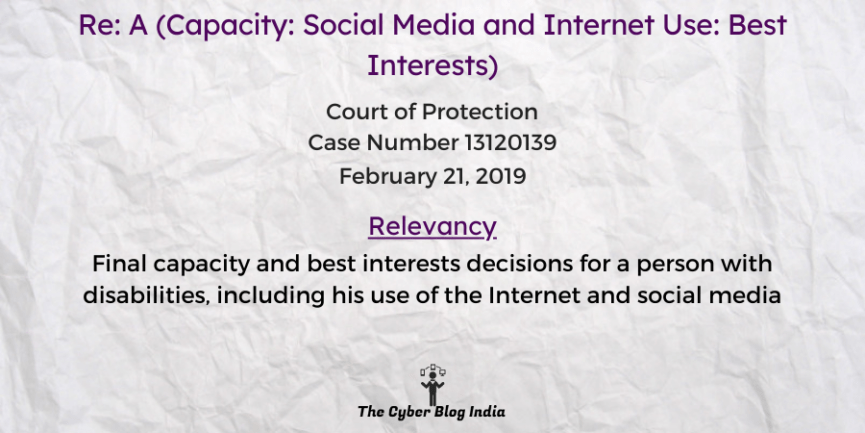Re: A (Capacity: Social Media and Internet Use: Best Interests)

Re: A (Capacity: Social Media and Internet Use: Best Interests)
[2019] EWCPO 2
In the Court of Protection
Case Number 13120139
Before Justice Cobb
Decided on February 21, 2019
Relevancy of the Case: Final capacity and best interests decisions for a person with disabilities, including his use of the Internet and social media
Statutes and Provisions Involved
- The United Nations Convention on the Rights of Persons with Disability (Article 9, 21, 22) (“UNCRDP”)
- The Mental Capacity Act 2005 (Section 1, 2, 3, 15)
Relevant Facts of the Case
- The case involves a young man with learning disabilities, A. This case focuses on making final capacity declarations under the Mental Capacity Act 2005. It also seeks to define the best interests’ decisions regarding his residence, contact, care arrangements, property, and financial affairs. It also addresses his capacity to consent to sexual relations and use of the Internet and social media.
- There are unique risks associated with social media and internet use for individuals with learning disabilities. It includes exposure to harmful content, sexual grooming, exploitation, and the potential for impulsive and risky online behaviour.
- There is a need to balance the protection of individuals with disabilities and their right to access information and communication technologies, as given in UNCRDP.
Prominent Arguments by the Counsels
- The local authority’s counsel emphasised the need for a care plan that includes supervised internet access. This will balance his rights under UNCRDP.
- The counsel, appearing on A’s behalf, argued that the court should treat Internet and social media use as a distinct issue from contact and care. The assessment of a person’s capacity to engage in online communication should happen separately from their capacity to make decisions about other forms of contact. The counsel also proposed an agreed formula, i.e., the functionality test. This test can examine if a person has the capacity to use the Internet or social media.
Opinion of the Bench
- The court leaned in favour of treating social media and internet use as distinct decisions from other forms of contact. The Internet involves unique risks and benefits for people with disabilities.
- To use social media and the Internet for online contact, a person needs to understand, retain, use, or weigh six pieces of information.
- The court relied on Dr. Milnes’s evidence. Dr. Milnes assessed A’s capacity and found significant deficits in understanding, using, and weighing relevant information.
- A cannot use the Internet or social media without any supervision. At the same time, the concerned parties must respect A’s autonomy and dignity and ensure that he receives appropriate support and education to develop his skills and understanding.
Final Decision
- The court approved a care plan allowing A to use an iPad under supervision for a limited time daily.
Aditi Mangesh Sawant, an undergraduate student at NMIMS Kirit P Mehta School of Law, Mumbai, and Adyasha Sahoo, an undergraduate student at the Institute of Law, Nirma University Ahmedabad, prepared this case summary during their internship with The Cyber Blog India in January/February 2024.
